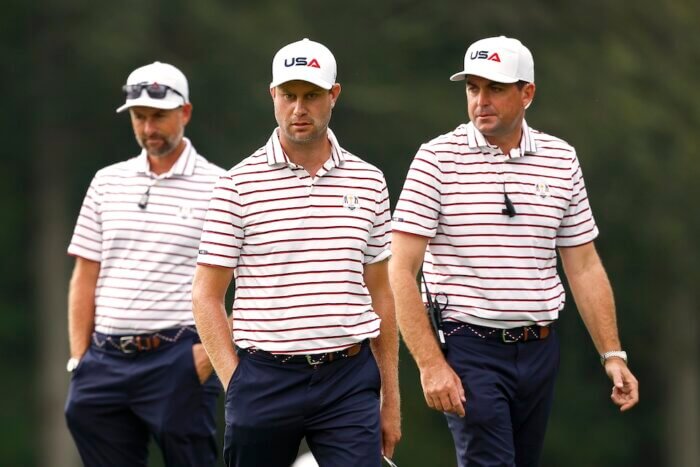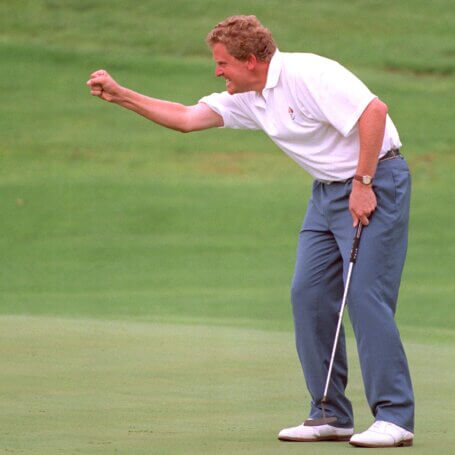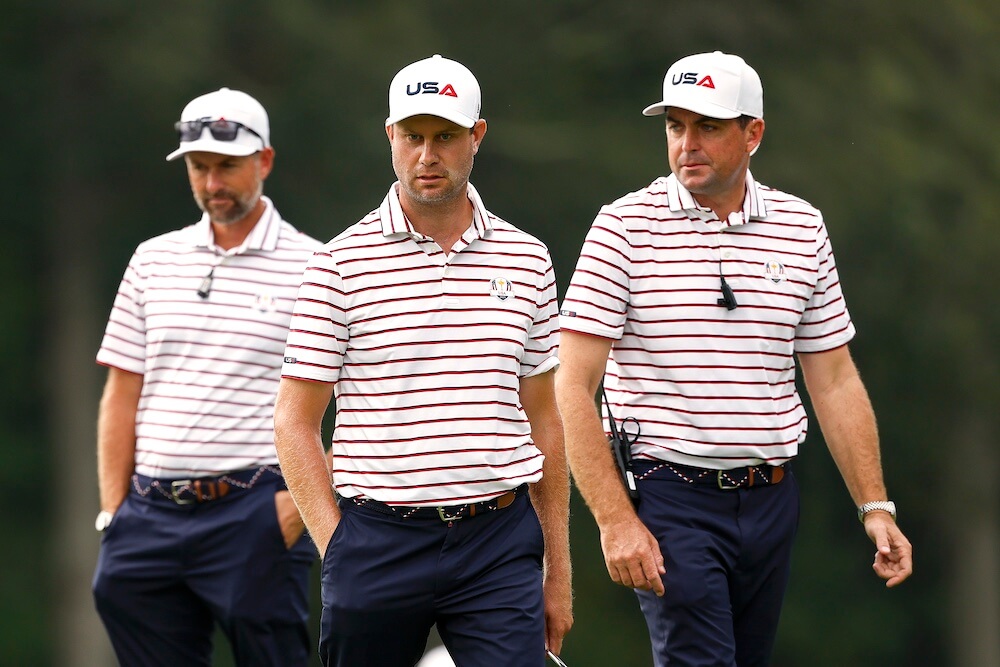 U.S. captain Keegan Bradley spoke Monday about American players’ Ryder Cup compensation. Harry How, Getty Images
U.S. captain Keegan Bradley spoke Monday about American players’ Ryder Cup compensation. Harry How, Getty Images
FARMINGDALE, NEW YORK | Harold Wilson, a British prime minister in the 1960s and 1970s, is credited with the saying: “A week is a long time in politics,” implying that governments, prime ministers even, can fall within seven days.
Wilson died years ago but versions of his saying regularly reappear in conversation. Here is another: “A week, specifically the Ryder Cup week, is a long time in golf.”
Arrive on Monday morning fresh-faced and keen to cover an event that does not start until Friday and you face a long haul of hours and days that must be filled. Sometimes, though, a story comes to you. Sometimes an incident, first reported in the buildup to Ryder Cup week, gets blown up into more than it deserves.
Question: Do we need to hear more about money at the Ryder Cup and the payments made to the U.S. players? This issue was the seventh question put to American captain Keegan Bradley at his first press conference of the 45th Ryder Cup. It is hardly a new subject. Payments began for U.S. men in 1999 when players received $200,000 to be given to two charities, one of their choosing and one of the PGA of America’s.
It bubbled up again early in Keegan Bradley’s current captaincy because he was asked by the PGA of America to “… bring the Ryder Cup into the present day. The charity dollars hadn’t changed much since 1999 and [the PGA of America] asked me to sort of shepherd their way into making it into 2025,” Bradley explained on Monday.
The answer was to increase the payment to $500,000 to each player, with $300,000 designated for charity and $200,000 as a stipend. Some, such as Scottie Scheffler, said his entire payment would go to charities with which he was associated without naming those charities. “The guys on our team are incredible people who do incredible things with charity dollars and their foundations,” Bradley said. “A lot of them aren’t comfortable sharing that sort of information, and I feel the same way.”
The Europeans resolutely decline payment for participating in a Ryder Cup, pointing out how well paid they are already and how much it means to them. One dozen former U.S. Ryder Cup captains, including Tom Watson, have opposed the PGA of America’s pay-for-play plan.
In taking payments for the biennial event in which they represent their country and repeatedly talk about the honour of doing so, the Americans are seen by some as ceding the moral high ground to the Europeans.
“I’m not concerned about what Europe does or what they think. I’m concerned about what my team is doing.” – Keegan Bradley
Bradley was asked whether this was evidence that the Ryder Cup meant more to the Europeans than to his men. His answer was swift. “I’m not concerned about what Europe does or what they think. I’m concerned about what my team is doing.
“We wanted to bring the Ryder Cup into today’s age and we felt like this was the best way to do it. We copied a lot of what the Presidents Cup does. I think a lot of good is going to come of this. I think the players are going to do a lot of good with this money and I think it’s great.”
The more this subject is talked about, the more it reflects well on Europe’s players. There is something old-fashioned, gentlemanly and honourable in this day and age about doing something as important as this without direct reward. Is it time though to say enough has been said on this subject for now?
Sometimes the preparations for a Ryder Cup are interrupted by an outside influence as happened in 2016 when Darren Clarke’s Europe players at Hazeltine in Minnesota, the venue where Tony Jacklin had won the 1970 U.S. Open, were broadsided by publication of a satirical article about Americans written by the brother of Danny Willett, a member of Clarke’s team. The reaction to this article caused such a stir in the U.S. that Clarke had to rip up his first morning’s foursomes pairings, shielding Willett, the reigning Masters champion, from the public eye. The US swept the morning foursomes, 4-0, only one match going to the 18th, on their way to a 17-11 victory two days later.
 Europe’s Colin Montgomerie made comments during the 1997 Ryder Cup for which he later apologized. Chris Turvey, EMPICS via Getty Images
Europe’s Colin Montgomerie made comments during the 1997 Ryder Cup for which he later apologized. Chris Turvey, EMPICS via Getty Images
Sometimes the players themselves raise the pre-match temperature as on the eve of the 1997 match in Spain when Colin Montgomerie suggested Phil Mickelson was “unreliable” and said, as Brad Faxon was getting divorced, “… I don’t think he’ll be with it.” Two Americans, neither due to play at Valderrama, came to Mickelson’s and Faxon’s defence. Fred Funk called Montgomerie the “jerk of the world” and Bob Estes suggested the big Scot was “a crybaby.” Montgomerie wrote to the U.S. team members apologising.
Let us not dwell on Tom Watson’s instruction to his 1993 team not to sign autographs at an official dinner in Birmingham, England, and the criticism he and his men got for that. For that matter, we shall pass over Golf Channel’s Brandel Chamblee calling Bryson DeChambeau “a captain’s nightmare” early in this Ryder Cup week on the grounds that Chamblee, while American, is a TV analyst and owes allegiance to neither side.
But Rory McIlroy’s response to Bryson DeChambeau’s intention to chirp in McIlroy’s ear at Bethpage Black this week has certainly generated considerable column inches and been noted in the U.S. team room. “I think the only way he gets attention is by mentioning other people,” McIlroy said of DeChambeau in an interview in The Guardian newspaper. “That is basically what I think of that. To get attention he will mention me or Scottie [Scheffler] or others.”
This may be McIlroy’s way of replying to DeChambeau’s criticism of him after they had played the final round at this year’s Masters together and DeChambeau complained that McIlroy, who won the tournament and thereby achieved golf’s career Grand Slam, did not say one word to him all afternoon.
It could be a dangerous tactic by McIlroy – and if it is it wouldn’t be the first to have been thought up and uttered in the early days of a Ryder Cup week. DeChambeau loves being the centre of attraction. He sees his role in golf as that of a showman and a role model for youngsters. He may be spurred to new heights in his play at Bethpage Black this week.
© 2025 Global Golf Post LLC


